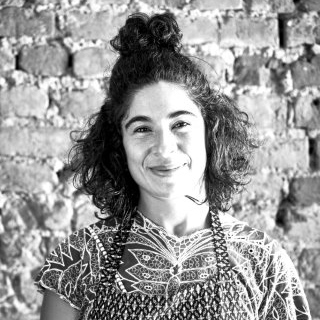click to dowload our latest edition
CLICK HERE TO SUBSCRIBE TO OUR NEWSLETTER


Published
6 years agoon
By
adminGILLIAN KLAWANSKY
For Saban, who was born in Cape Town to Israeli immigrants, food has always been about family. “Both my parents are big cooks and my mom is an ultra-cook – she still cooks like we’re all still living at home, although none of us is – she’s always waiting for visitors to come and eat! Food has always been the medium through which we could all express ourselves the most and show how much love we all have for each other. It’s the thing that brings us all together.”
Saban’s rich heritage plays a central role in her dishes. Her father is of Libyan descent, while her mother’s side of the family comes from Romania. While Sephardi food and traditions were the most prevalent influences in her home, Nirit spent two years working in Israel and spent time with her Romanian granny cooking, which was a big inspiration.
“But even my mom’s taken up a lot of my dad’s heritage in terms of cooking style,” she says. “We generally prefer the Sephardi way of cooking as it tends to be a bit richer and deeper in flavour and a little spicier with ingredients like paprika, peppers, chilli and garlic. It’s a nice mingle of Middle Eastern and Mediterranean flavours coming together.
“Even though it’s mainly from Spain and Italy and that side of Europe, this influence went to Israel and was combined with Middle Eastern flavour to create Sephardi cooking, which is now in a great space. My family and I do a lot more Sephardi cooking than Ashkenazi, but we love both sides so we just choose the best of both.”
With the undeniable link between food and festivals, Jewish tradition for Saban is also tied up in cooking. “The religious side of my life is all about the traditions and having everyone come together – having that base is very unifying,” she says.
“Our shul is quite small compared to Ashkenazis and we still have the old-school Sephardis who are making borekas and all the traditional pastries and sweet things. The world is moving so quickly and we’re losing that real sense of tradition in all religions, I think.” Aside from the obvious influence Sephardi food traditions have on Saban’s restaurants and cookbooks, they also shine when it comes to chagim. “For Pesach, we usually make chraime, a classic fish dish that my dad’s mom makes,” she says.
“You need a meaty fish, usually we use salmon but you can use fish like yellowtail, tuna or dorado and marinate it overnight in lemon juice. Then you create a sauce with finely diced or grated onion, lots of garlic, tomato paste, paprika, cumin and a bit of the lemon juice and water.
“You simmer that sauce for 10 to 15 minutes and when it gets thick and delicious you add your fish and then cook for another 10 to 15 minutes till the fish is ready. It’s quite a spicy dish, but it’s also got a nice lightness to it.”
One of Saban’s favourite Rosh Hashanah family food traditions, is serving fritters at the start of the meal, when making brachot. “My mom makes four types of fritters, spinach, sweetcorn, butternut and cinnamon and leek and onion. On your plate you have these fritters together with dates, pomegranates and your apples and honey.
“Those fritters before the main meal is everything to me, that’s me full! And I love the fact that we dip these fritters into the honey as we say the brachot – it’s the contrast of sweet and savoury coming together.” As Chanukah approaches, Saban reflects further on family traditions around the festival. There’s the traditional mouth-watering Sephardi food. “For Chanukah, my mom and dad usually make a pastry which is a soft dough that they fry, called Sfinj. They put lots and lots of icing sugar on top but you can also use honey.
“They also make bistil – something my dad’s mom used to make. It’s quite a thing, it takes lots of time and effort. You mash potatoes and you separately make a semi-spicy mince filling with onions, coriander and spices. Then you mould mash on one side of your hand so you make a pocket and fill the inside with the mince. You close the other side with mash and dust it with flour and egg, and flour again and then you fry each of them.
“My parents usually make that every Chanukah for dinner as a light meal served with a simple lettuce, tomato and cucumber salad.”
As she talks about festivals and food, it’s clear that for Saban, cooking isn’t a job, it’s a passion. Having originally started Sababa, a restaurant in Sea Point with her sister Tal Smith, with whom she penned a successful cookbook of the same name, Saban left almost seven years ago to run another branch in the City Bowl. This later became her now independent restaurant, Olami.
“The food world always seemed very inviting to me just because it’s endless and now that we’ve changed the restaurant’s name to Olami which means world, global, or universal, it’s opened up every option available to me,” she says.
“Eating is such a primal need, so to be able to celebrate that and nourish your body, soul and spirituality, is special,” she says. “I’m continually inspired to evolve and be as fresh as possible, to stick with what people want, but also introduce new things they might not have thought of.”
Having just released her second cookbook, Olami, which is filled with simple recipes underpinned by Middle Eastern and Mediterranean flavour, it’s clear Saban’s doing just that.
